
- By Dotbooker
- Nov 03, 2025
- 1418
Top 10 Best Gym Booking Software in USA & Canada for 2025
Picture this: members reserving their favorite spin class while commuting to work, trainers checking attendance with one tap, and owners having full visibility of schedules and payments in real time. This is what modern gym booking software makes possible.
In today’s competitive fitness industry, a reliable booking platform doesn’t just keep the calendar organized—it helps gyms deliver the seamless, tech-driven experiences that members now expect.
In this blog, we’ve rounded up the 10 best gym booking systems shaping 2025, along with their official links where you can explore more details and get essential information about each software.
1. Mindbody
Mindbody is one of the most recognized fitness booking platforms, offering a full ecosystem that covers class reservations, memberships, payments, and marketing campaigns. It’s widely used by gyms, studios, and wellness centers.
Its strong analytics and client engagement tools make it especially popular among larger studios. However, even small gyms benefit from its ability to unify in-person and virtual fitness experiences.
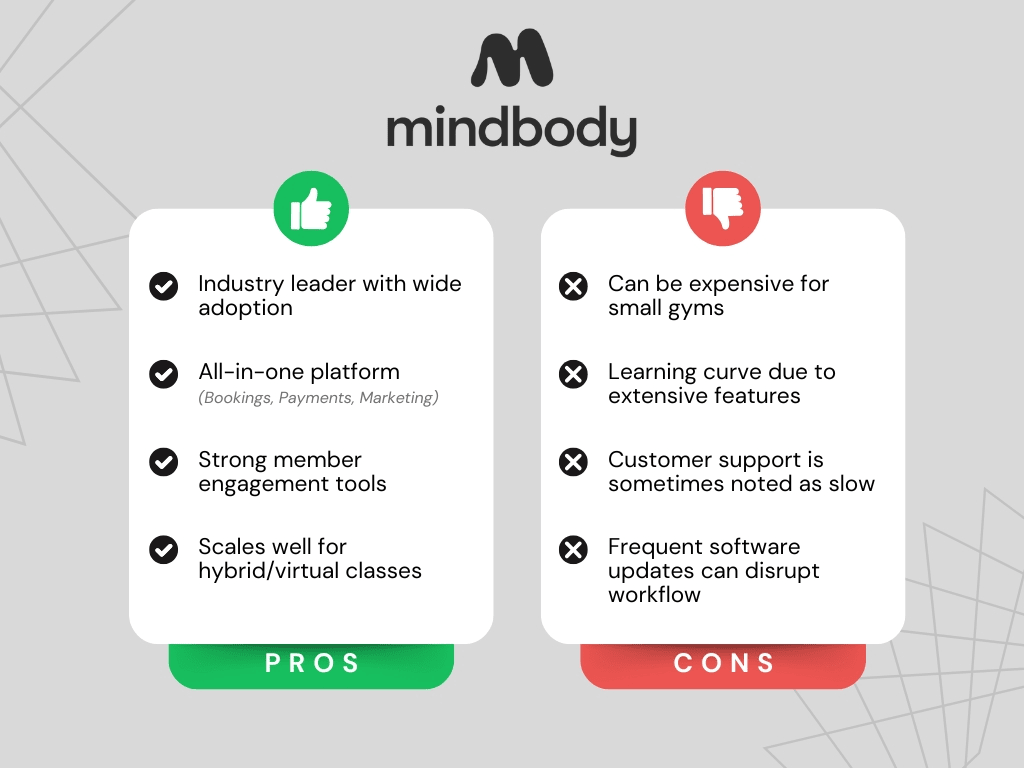
Pros
- Industry leader with wide adoption
- All-in-one platform (bookings, payments, marketing)
- Strong member engagement tools
- Scales well for hybrid/virtual classes
Cons
- Can be expensive for small gyms
- Learning curve due to extensive features
- Customer support is sometimes noted as slow
- Frequent software updates can disrupt workflow

2. Zen Planner
Zen Planner focuses on structure and efficiency with automated billing, attendance tracking, and performance benchmarks. It’s designed to reduce admin work while boosting client accountability and retention.
The platform is especially valued by gyms that run multiple classes daily and need error-free scheduling. Its member progress tracking also helps in creating a culture of discipline and growth.
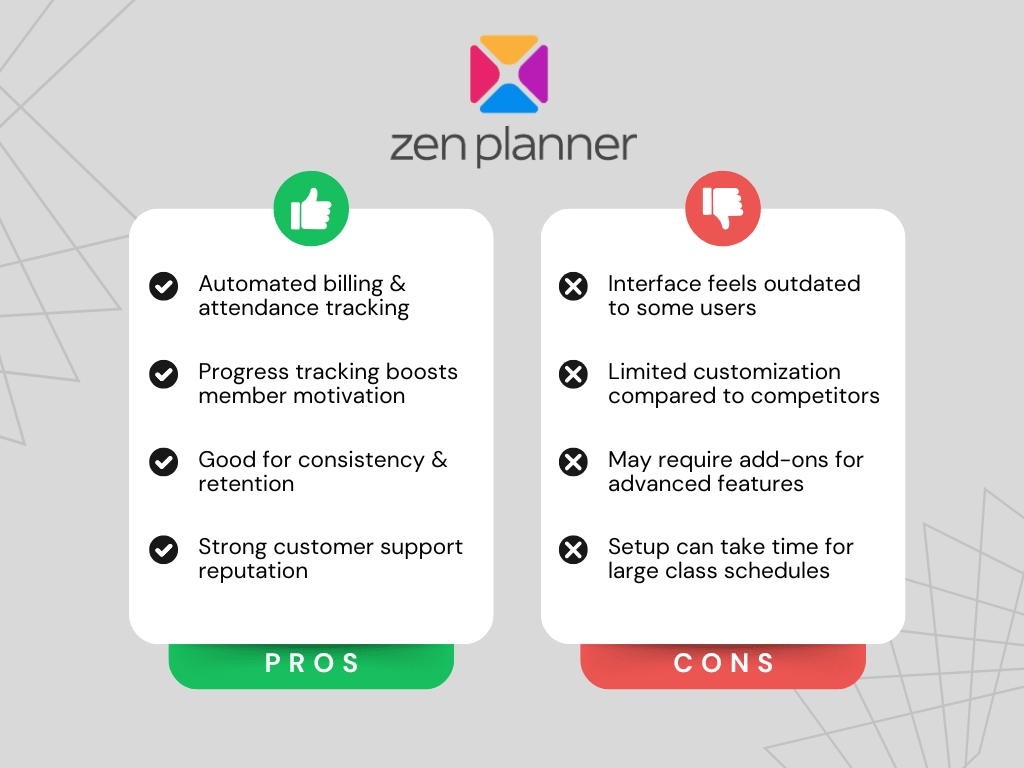
Pros
- Automated billing & attendance tracking
- Progress tracking boosts member motivation
- Good for consistency & retention
- Strong customer support reputation
Cons
- Interface feels outdated to some users
- Limited customization compared to competitors
- May require add-ons for advanced features
- Setup can take time for large class schedules
3. Glofox
Glofox offers branded mobile apps for gyms, enabling members to book classes, receive push notifications, and make payments conveniently. It helps fitness businesses stand out with modern, customized digital experiences.
The system is particularly appealing for boutique studios that want to maintain a polished brand image. With built-in analytics, owners can fine-tune schedules to maximize class attendance.
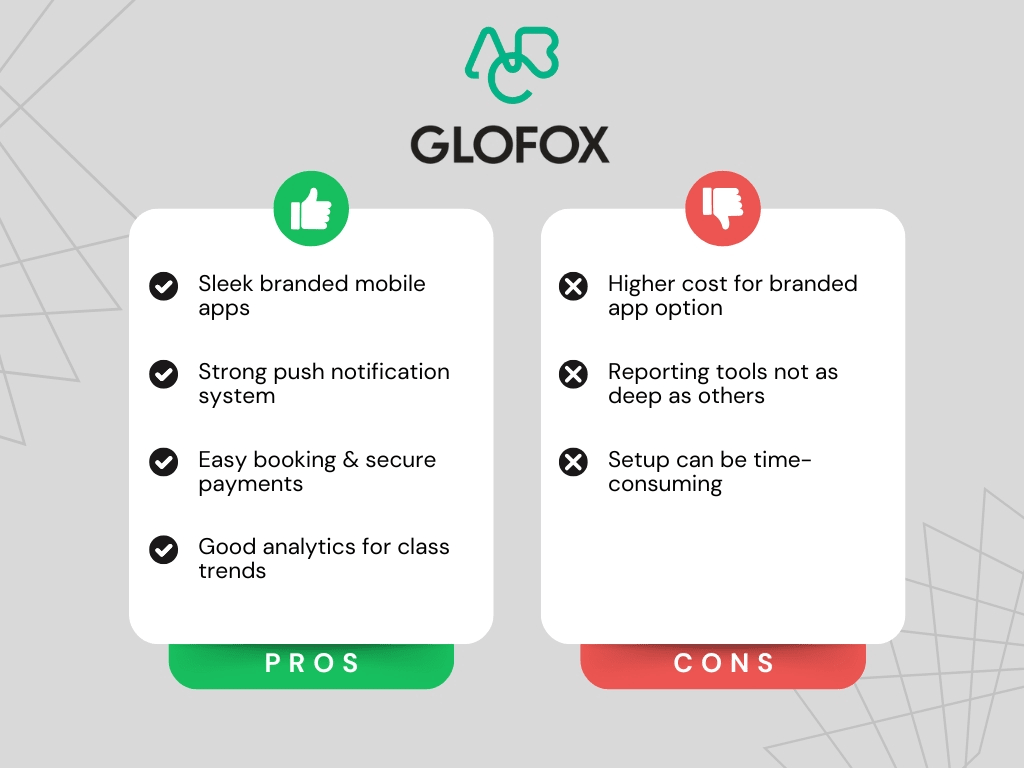
Pros
- Sleek branded mobile apps
- Strong push notification system
- Easy booking & secure payments
- Good analytics for class trends
Cons
- Higher cost for branded app option
- Reporting tools not as deep as others
- Setup can be time-consuming
4. Dotbooker
Dotbooker is a versatile solution for gyms and wellness businesses, offering dynamic calendar management, waitlist features, integrated payments, and e-wallet support.
It scales well for both single and multi-location setups. Its no-show management ensures better revenue retention by filling empty slots quickly. By combining bookings, payments, and member management, Dotbooker becomes a central hub for smooth operations.
Alt tag: .
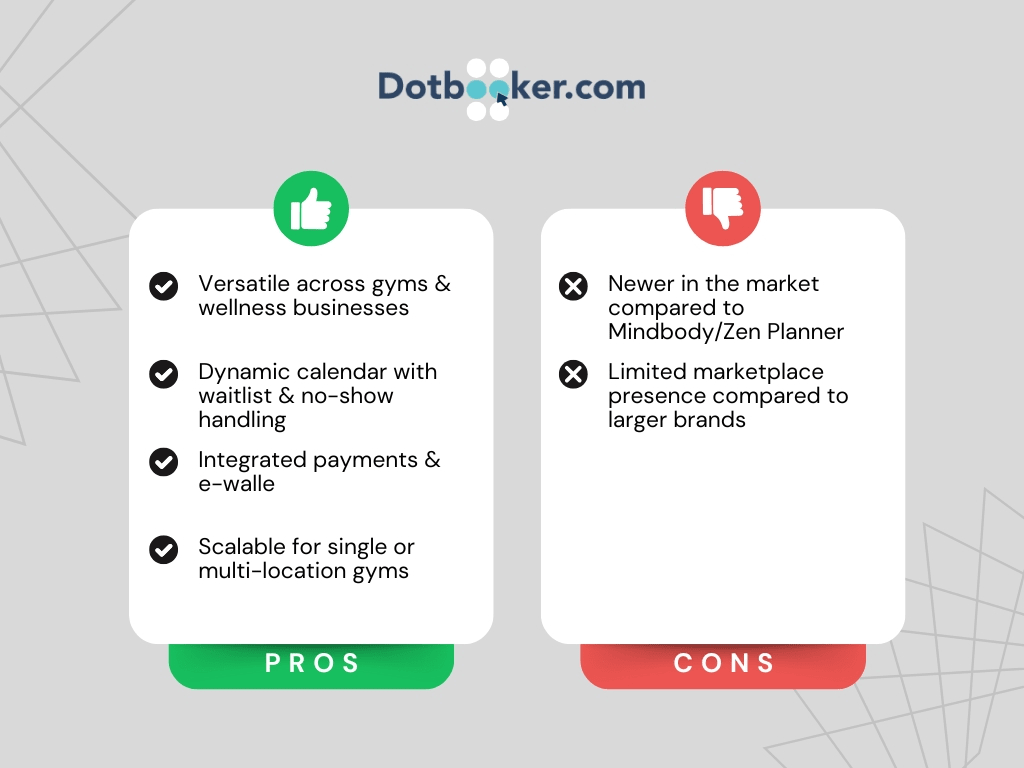
Pros
- Versatile across gyms & wellness businesses
- Dynamic calendar with waitlist & no-show handling
- Integrated payments & e-wallet
- Scalable for single or multi-location gyms
Cons
- Newer in the market compared to Mindbody/Zen Planner
- Limited marketplace presence compared to larger brands
5. PushPress
PushPress takes a simplified approach to bookings with easy class reservations, digital waivers, and automated reminders. It’s lightweight and intuitive, making it ideal for gyms that want a no-fuss solution.
The clean interface ensures minimal staff training is needed, which saves time for smaller gyms. Its focus on essentials makes it a good entry-level option for fitness businesses new to digital booking.
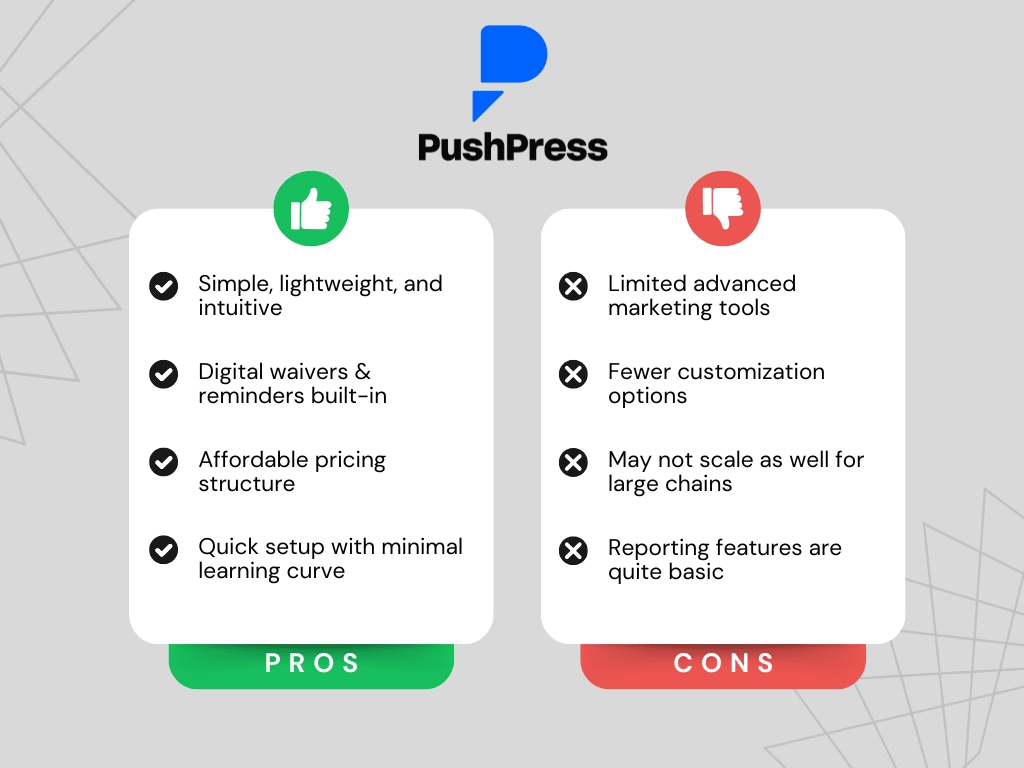
Pros
- Simple, lightweight, and intuitive
- Digital waivers & reminders built-in
- Affordable pricing structure
- Quick setup with minimal learning curve
Cons
- Limited advanced marketing tools
- Fewer customization options
- May not scale as well for large chains
- Reporting features are quite basic
6. Virtuagym
Virtuagym goes beyond scheduling by combining workout planning, nutrition tracking, and community tools into one platform. It helps gyms position themselves as complete fitness and lifestyle partners.
Its flexibility makes it ideal for businesses that want to provide holistic wellness services. By engaging members both inside and outside the gym, it strengthens long-term client loyalty.
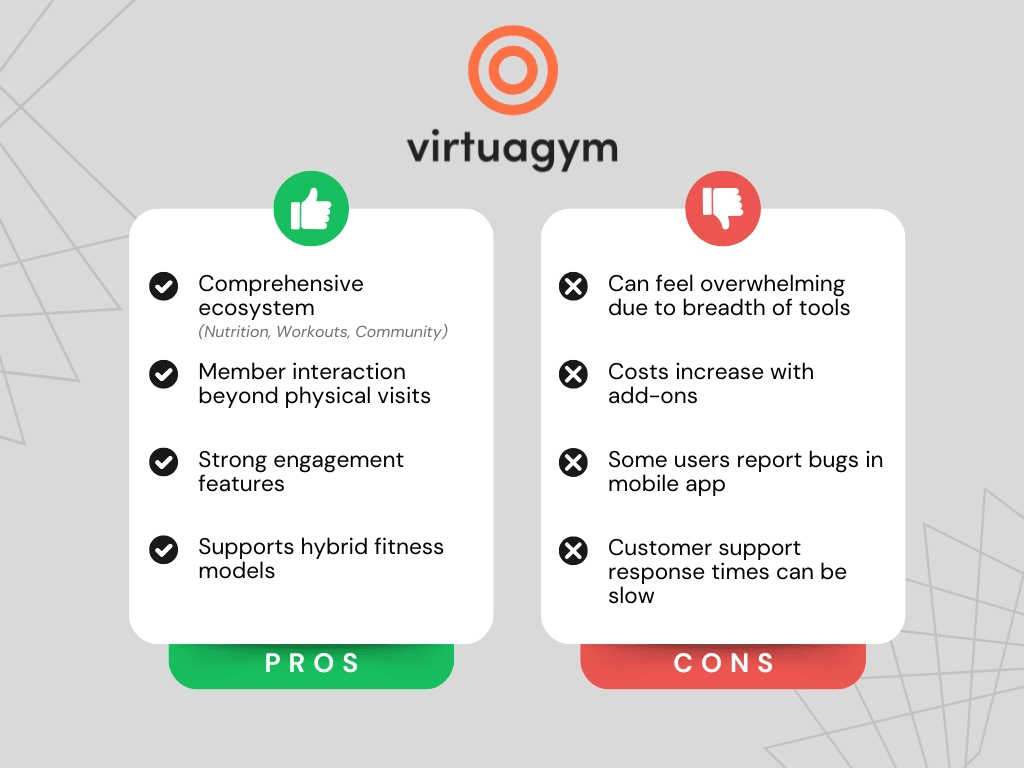
Pros
- Comprehensive ecosystem (nutrition, workouts, community)
- Member interaction beyond physical visits
- Strong engagement features
- Supports hybrid fitness models
Cons
- Can feel overwhelming due to breadth of tools
- Costs increase with add-ons
- Some users report bugs in mobile app
- Customer support response times can be slow
7. WellnessLiving
WellnessLiving offers a balance of booking and retention features. Along with class reservations, it includes loyalty programs, customizable apps, and reporting tools that help gyms grow sustainably.
Its all-in-one structure makes it suitable for medium-sized fitness centers with growth ambitions. The reward-driven engagement model also gives gyms a competitive edge.
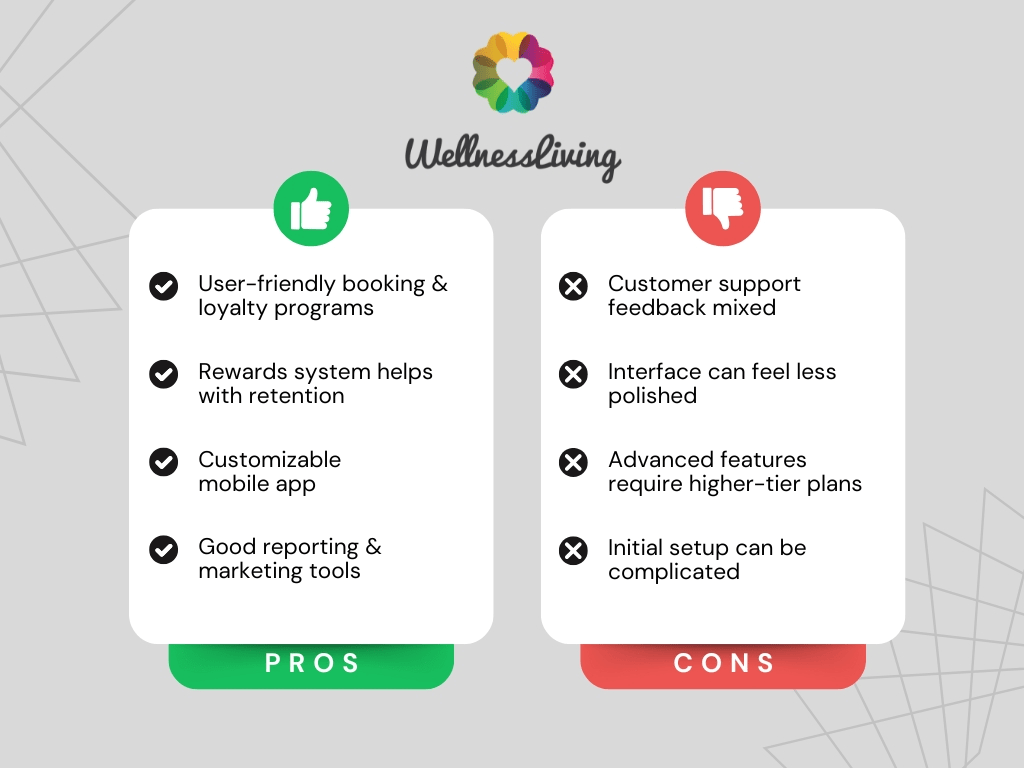
Pros
- User-friendly booking & loyalty programs
- Rewards system helps with retention
- Customizable mobile app
- Good reporting & marketing tools
Cons
- Customer support feedback mixed
- Interface can feel less polished
- Advanced features require higher-tier plans
- Initial setup can be complicated
8. Vagaro
Vagaro serves both the wellness and fitness industries, with features like recurring billing, class reservations, and staff scheduling. Its built-in marketing tools make it a strong choice for gyms that want to boost engagement.
The platform is also beneficial for hybrid businesses that offer both fitness and wellness services. Email campaigns and promotions help gyms attract new clients while keeping existing ones active.
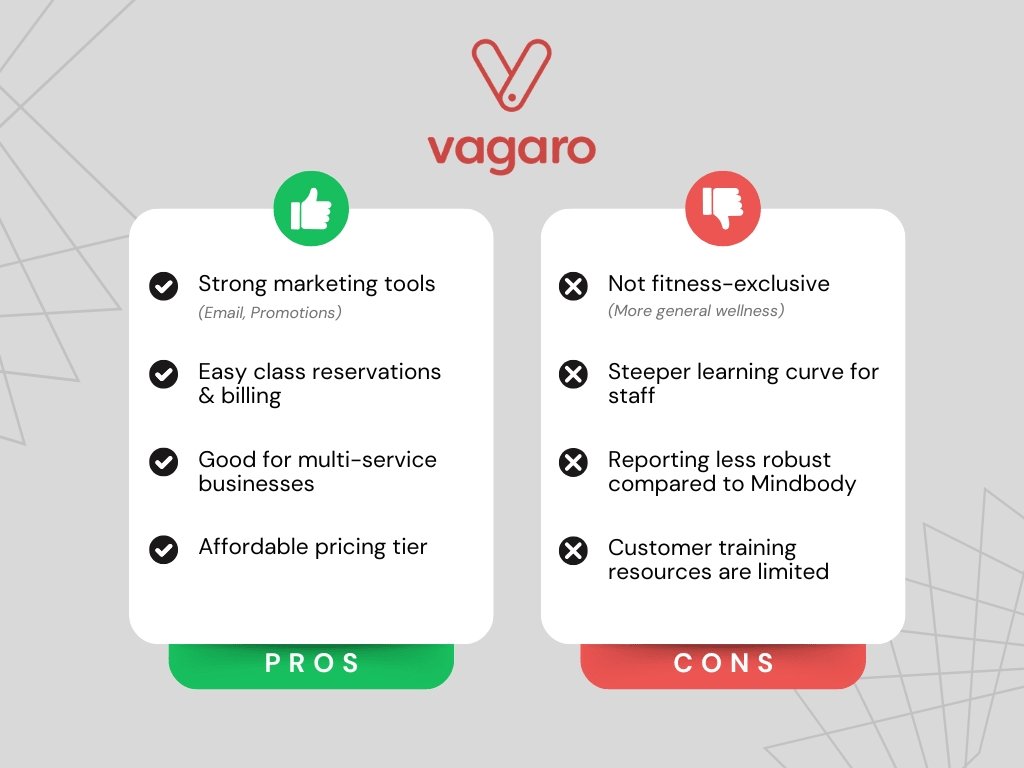
Pros
- Strong marketing tools (email, promotions)
- Easy class reservations & billing
- Good for multi-service businesses
- Affordable pricing tiers
Cons
- Not fitness-exclusive (more general wellness)
- Steeper learning curve for staff
- Reporting less robust compared to Mindbody
- Customer training resources are limited
9. Pike13
Pike13 is a straightforward, reliable booking system with a centralized dashboard for schedules, payments, and client communication. It emphasizes ease of use and stability over flashy features. Because of its simplicity, it’s often chosen by gyms that want smooth daily operations without complexity. Its solid reporting tools also make it useful for tracking revenue and staff performance.
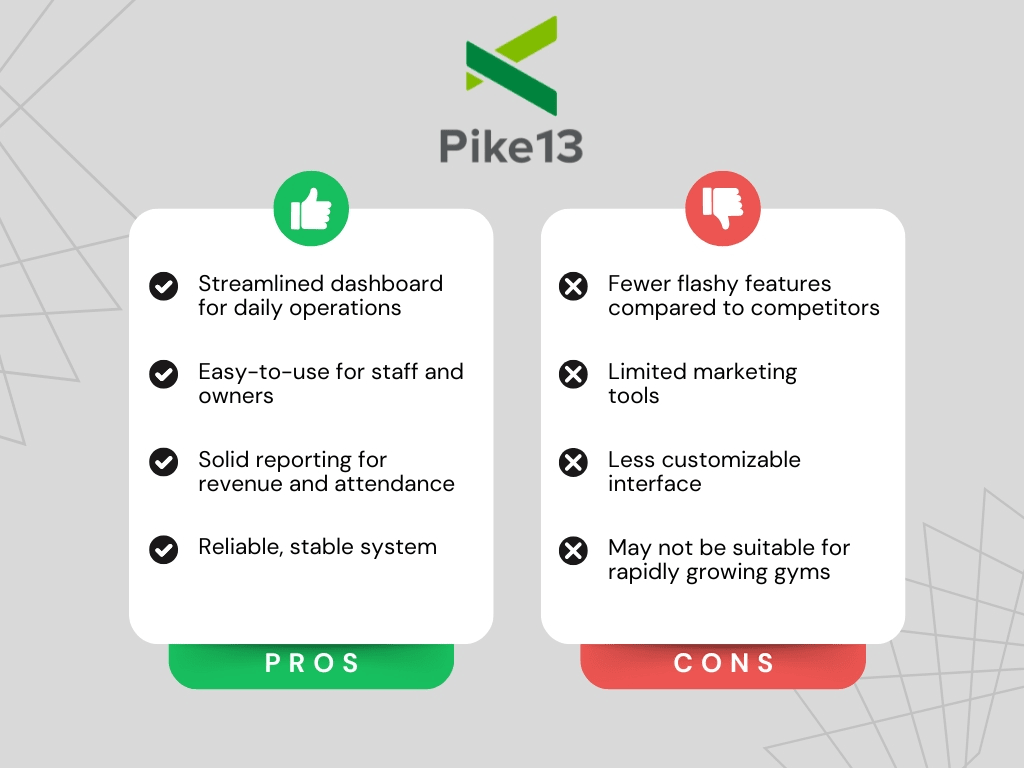
Pros
- Streamlined dashboard for daily operations
- Easy-to-use for staff and owners
- Solid reporting for revenue and attendance
- Reliable, stable system
Cons
- Fewer flashy features compared to competitors
- Limited marketing tools
- Less customizable interface
- May not be suitable for rapidly growing gyms

10. ClubReady
ClubReady is tailored for larger gyms and multi-location businesses, combining booking with CRM, sales automation, and performance tracking. It’s built to support growth and scalability.
The platform is highly effective for franchises that want centralized oversight. Its advanced sales features also make it a good fit for gyms looking to expand aggressively in competitive markets.
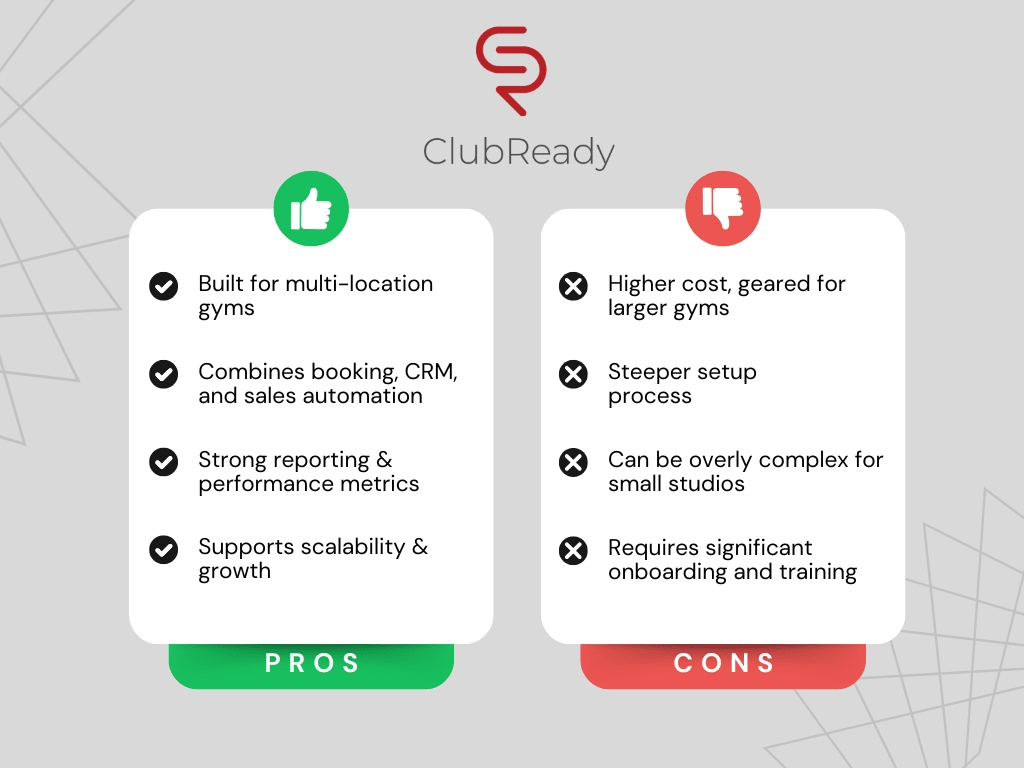
Pros
- Built for multi-location gyms
- Combines booking, CRM, and sales automation
- Strong reporting & performance metrics
- Supports scalability & growth
Cons
- Higher cost, geared for larger gyms
- Steeper setup process
- Can be overly complex for small studios
- Requires significant onboarding and training
Shaping the Future of Fitness Scheduling
Technology is no longer an optional extra for gyms—it’s the backbone of operations and member experience. Tools like Dotbooker demonstrate how modern booking systems can seamlessly integrate scheduling, payments, client management, and engagement into a single, streamlined platform.
In 2025, the gyms that thrive will be those that see software as more than a back-end utility. They’ll use it as a partner in building stronger connections, driving retention, and creating a community that keeps members coming back.
Popular Blogs
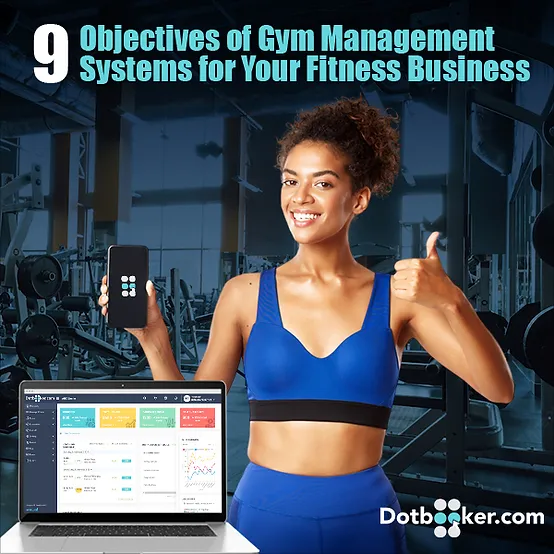
- Oct 20, 2022
- 5071

- Sep 08, 2024
- 4467

- Nov 11, 2022
- 3866

- Sep 16, 2024
- 3154
Transform your business now!

Get an expert consultation for your business's streamlined operations.